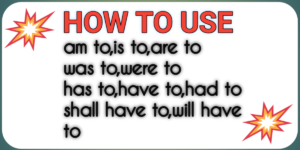Discuss- is to, am to, are to, was to, were to, has to, have to, had to, shall have to, will have to + v1
1. Use of -has to, have to (present)
यदि वाक्य के अंत में ना है या पड़ता है
Third person singular number-He /she/ it/ this/ that /name + has to
We /you /they/ plural number – have to
मुझे जाना है या पड़ता है।
I have to go.
मुझे नहीं जाना पड़ता है।
I have not to go.
क्या मुझे जाना है?
Have I to go?
उसे जाना है पड़ता है।
He has to go
उसे जाना नहीं पड़ता है।
He has not to go
क्या उसे जाना पड़ता है ?
Has he to go?
उसे पढ़ना है।
She has to read.
उसे नहीं पढ़ना है ।
She has not to read.
क्यों से पढ़ना है?
Has she to read?
Roshan has to go to market .
रोशन को मार्केट जाना पड़ता है।
Roshan has not to go to market.
रोशन को मार्केट जाना नहीं पड़ता है।
Has Roshan to go to market?
क्या रोशन को मार्केट जाना पड़ता है?
We have to play football.
हम लोगों को फुटबॉल खेलना पड़ता है।
We have not to play football
हम लोगों को फुटबॉल नहीं खेलना है।
Have we to play football
क्या हम लोगों को फुटबॉल खेलना है?
You have to go to the market.
तुम्हें मार्केट जाना है।
You have not to go to market
तुम्हें मार्केट नहीं जाना है।
Have you to go to market?
क्या तुम्हें मार्केट जाना है?
2. Had to ( past)
यदि वाक्य अंत में ना था, नी थी ,ने थे ,या फिर पडता था ,पडती थी,पडते थे ।
मुझे जाना था ।
I had to go.
मुझे नहीं जाना था।
I had not to go.
क्या मुझे जाना था?
Had I to go?
तुम्हें मार्केट जाना पड़ता था। पड़ा
You had to go to the market.
तुम्हें मार्केट नहीं जाना पड़ता था/ पड़ा
You had not to go to market.।
क्या तुम्हें मार्केट जाना था?
Had you to go to market?
उसे मार्केट जाना पड़ता था।
He had to go to market.
उसी मार्केट नहीं जाना पड़ता था।
He had not to go to market.
क्या उसे मार्केट जाना पड़ता था ?
Had he to go to market?
3. Shall have to / Will have to ( future)
यदि वाक्य के अंत में ना पड़ेगा ,ना पड़ेगी ,ना होगा, ना होगी । (I,We- shall have to)
मुझे जाना पड़ेगा ।
I shall have to go.
मुझे जाना नहीं पड़ेगा ।
I shall not have to go.
क्या मुझे जाना पड़ेगा?
Shall I have to go?
हम लोगों को जाना पड़ेगा ।
We shall have to go.
हम लोगों को नहीं जाना पड़ेगा ।
We shall not have to go.
क्या हम लोगों को जाना पड़ेगा?
Shall we have to go?
उसे मार्केट जाना पड़ेगा।
He will have to go to the market.
उसे मार्केट नहीं जाना पड़ेगा।
He will not have to go to market.
क्या उसे मार्केट जाना पड़ेगा?
Will he have to go to market?
तुम्हें मार्केट जाना पड़ेगा।
You will have to go to the market.
तुम्हें मार्केट नहीं जाना पड़ेगा।
You will not have to go to the market.
क्या तुम्हें मार्केट जाना पड़ेगा?
Will you have to go to the market?
4. is to/am to/ are to-( present)
यदि वाक्य के अंत में वाला हूं ,वाली हूं ,या फिर वाले हो ,या को हूं।
मैं जाने को हूं या मैं जाने वाला हूं।
I am to go .
I am not to go. मैं नहीं जाने वाला हूं।
Am I to go? क्या मैं जाने वाला हूं?
वह जाने वाला है।
He is to go
वह नहीं जाने वाला है।
He is not to go.
क्या वह जाने वाला है?
Is he to go ?
वह जाने वाली है।
She is to go .
वह नहीं जाने वाली है।
She is not to go
क्या हुआ जाने वाली है?
Is she to go?
हम लोग मार्केट जाने वाले हैं।
We are to go to market.
हम लोग मार्केट नहीं जाने वाले हैं।
We are not to go to market.
क्या हम लोग मार्केट जाने वाले हैं?
Are we to go to market?
I- am to
Third person singular number -he /she/ it /this/ that /name- is to
We/ you/ they /plural number- are to
5.Was to/ were to- (past)
यदि को वाक्य के अंत में -को था /वाला था / वाली थी / वाले थे।
Third-person singular number-
He/ she /it /this /that/name – was to
I – was to
We/ you / these /those/plural number- were to
मैं जाने को था /वाला था।
I was to go.
मैं नहीं जाने वाला था।
I was not to go.
क्या मैं जाने वाला था?
Was I to go?
वे स्कूल जाने वाले थे।
They were to go to school.
वे स्कूल नहीं जाने वाले थे।
They were not to go to school.
क्या वे स्कूल जाने वाले थे?
Were they to go to school?
रीता किताब पढ़ने वाली थी।
Rita was to read a book.
रीता किताब नहीं पढ़ने वाली थी।
Rita was not to read a book.
क्या रीता किताब पढ़ने वाले थी।
Was Rita to read a book?
Note: Frist person I – We
Second person You – You
Third-person He /She /It /This/That /Name/Boy/Girl – They/These/ Those /Boys
